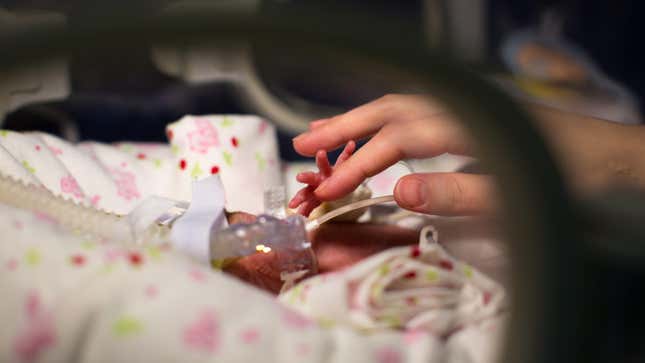Who’s Really to Blame for Kyte Baby’s Shitty Maternity Leave Policy?
Ultimately, the story is less of an indictment of one baby brand than it is about the entire system of paid leave in the United States–or lack thereof.


MomTok is typically a place where young mothers go to share baby-rearing tips, show off their favorite products, and commiserate about the struggles of motherhood, from latch issues to sleep training. This week, however, the moms of TikTok only have one word on their minds: boycott. The subject of their ire is Kyte Baby, a woman-owned brand that makes bamboo baby clothes and accessories that had previously been a favorite product of momfluencers. Now, they are onesies-non-grata thanks to CEO Ying Liu’s decision to deny maternity leave to one of her employees who had an adoptive baby in the NICU. The conversation has reached such a frenzy that some moms filmed themselves throwing their Kyte Baby onesies into the snow or even, according to some reports I’ve yet to find video evidence for, lighting them on fire.
The drama that’s been unfolding since last week has thus far led to hundreds of stitches from angry moms, two lukewarm CEO apology videos, and a chorus of frustrated mothers grappling with whether trashing a minority-owned small business is the right way to support one of their own. Ultimately, the story is less of an indictment of one baby brand than it is the entire system of paid leave in the United States–or lack thereof–that often leaves new moms in the position of having to choose between their newborn and their jobs. Like a blown-out diaper, this entire situation is bursting at the seams with shit, so let’s unpack, shall we?
The story centers around Kyte Baby employee Marissa Hughes, whose adopted son Judah was born at just 22 weeks and is being cared for in a NICU nine hours from her home in the Dallas area. According to a now-deleted TikTok by Marissa’s sister from January 17, Hughes struggled with infertility for years but was matched with baby Judah around Christmas and immediately adopted him. Kyte Baby was aware that Marissa was going through the adoption process but granted her just two weeks paid leave to take care of her sick baby. According to the sister, Marissa then established a remote work agreement so she could keep working from the NICU while Judah continued to recover after her two weeks were over.
“If there’s one thing we all know about internet discourse, it’s that it can’t be stopped by a few front-facing camera apologies, scripted or not.”
(Side note: Does anything say “late-stage capitalist hellscape” more than logging into a Zoom meeting from the NICU so you don’t lose the job you need to pay for your baby in the NICU?)
Then, in a stunning reversal, Liu informed Marissa that her remote work accommodation was being rescinded and that she would have to return to work to do her job on-site. Failure to do this, Marissa was informed during a meeting with higher-ups, would result in her termination–though they apparently added that if she decided to come back to work after dealing with the whole “very sick newborn” thing, they’d consider giving her her job back. How kind.
Kyte Baby exploded almost immediately on TikTok, with MomTokkers vowing to boycott over the company’s poor treatment of Marissa. In particular, adoptive parents and moms who had dealt with babies in the NICU felt that Kyte Baby’s response to Marissa’s situation was not only poorly handled but reflective of the types of issues they often face when trying to get accommodations for their sick and/or non-biological children.
The conversation developed so rapidly that by January 18–just one day after Marissa’s sister’s TikTok was posted–Liu delivered a highly scripted statement on TikTok in which she said she wanted to “sincerely apologize to Marissa for how her parental leave was communicated and handled,” and that “Kyte Baby prides itself on being a family-oriented company” that treats “biological and non-biological parents equally.”
@kytebaby
To say that this apology was poorly received would be an understatement. Angry TikTokkers blasted Liu in the comments for her stilted, rehearsed nature, saying the video felt more like damage control than genuine remorse. The backlash quickly spawned another, more “unplugged,” version of Liu’s apology, posted the same day.
-

-

-

-

-

-

-

-

-

-

-

-

-

-

-

-

-

-

-

-

-

-

-

-

-

-

-

-

-

-

-

-

-

-

-

-

-

-

-

-








































